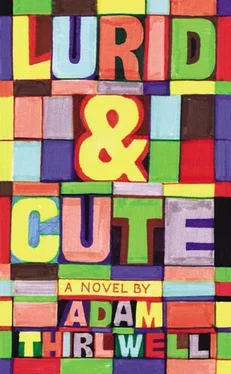— I’m going to count to three, I said, — and by three you need to be sitting back down.
It seemed a reasonable offer but she said nothing to me. She just looked at me, and I found that unnerving but I continued to count to three, nevertheless, since if you have made a threat you must always try to fulfil it, that’s the basic rule of society, whether gangster or gallerina, and I was relieved to see that as I did so she began to sit back down.
— No, said the waiter to her. — You should go.
I admit I was definitely surprised. He had such assurance, and I would have been full of admiration, had it not been also such a delicate moment, and also had it not been one more moment where my authority was being questioned. It made the situation, I thought, much more difficult than was necessary and wistfully I considered once again how onerous is any form of work. There’s no end to the complications. The same feeling must occur everywhere, not just for me or the editor of some local diario besieged by a violent mob, but also the collector of rare spiders and the assistant in a hospice. No one is exempt. But most of all I felt a righteous rage. Here was this man, without any sense of duty, with no sense of respect, and once again he was treating me as if I posed no threat. So that as if to contradict him, I found myself close to him, and pointing the gun in his face. And this was a very different feeling to what I had felt before, in the nail salon, where I had been anxious as much as possible to preserve everyone’s calm, and not invade their moral space, the transparent envelope that I had assumed enveloped everyone. It was as if I had previously thought that everyone had this moral space around them, like in the grandest cable car or Ferris wheel, but what — this was the question now being presented, in a very violent form — if that wasn’t true? What if everyone’s available to everyone? I don’t mean that’s a world I love but that may well be the only one that exists, or at least that was how it seemed, with this sudden invasion I was performing of another person. As I said, I think that I was less in control of events than I might have thought. I could see the gun shaking in my hand and I knew that I was running out of methods to assert myself.
if it is to end well
But to be in a duo is always very restful — it enables each person to help the other out, and in many ways this duo I formed with Hiro was the best society I ever knew. He always moved very deftly, and behind me I could sense him moving with purpose and a gentle grace towards the counter. I was trying to hold the eye of the waiter. I had no idea if other people were present, presumably there must have been a chef to produce the mismatched food, but I could not see him. There was just this Wild West idyll, while Hiro took the money and beckoned me to follow him to the door. Just for a moment I still paused, however, because I was momentarily shaken by the violence of my feelings and was in a stalled confusion. The woman’s notebook was open on her table with the pen beside it, and I imagined it soon to be dark with her panicked writing. I think I wanted to apologise or at least show that I could calm down and was not a monster, because the expression on this man’s face was not an expression I ever wanted to see, it was sickly and with all the pain of something melted or gone awry, the way a shoulder looks awry when it’s been dislocated. I knew that I had caused this kind of pain and I wanted to assert that to do so was way beyond anything I had ever intended, but of course in these situations you do not get the opportunity for interviews and retrospective summations. Do the clothes you wear express you, as the underwear models and character actors believe? Do your actions prove anything at all? I had never quite thought they did — but now that I was outside in the fluorescent light it did seem I might have been wrong. And yet I wanted to still maintain that I had only meant very well. The ideal, and it was an ideal, was of a noble restitution — where we would assert our variety of justice, with no violence done to anyone. And should one really abandon an ideal, just because of local problems? I know my rages very well. They’re like a pet whom people fear, but where the owner smiles encouragingly to other people — because she knows it will not scare, will do no harm. But also I can understand the arguments against that.
& to a new high-energy atmosphere
For maybe just a few hours or days later I was once more filled with a gorgeous seam of energy, like I was on a megadose of vitamin supplements and antioxidants. Still I was oblivious to any form of imminent punishment. It really did seem that if we kept up this level of energy, we were on the brink of one final revelation, in the full pistachio light, and in particular it encouraged me to enlarge my personal recreations. I had never felt such power and talent for maintaining so many people. Our exploits offered a distinct sense of possibility. I became a monster of industriousness, as if everywhere opposing forces were going about their dire work, and I had to try to ward them off — like a game of computer tennis. Although if I really did sense that nothingness was depleting the world I lived in, the way the ghosts deplete things without you really knowing they are there, I cannot be sure. From this distance, it’s impossible to know. So many time frames were occurring all at once! They overlapped and dislocated. But still, I was definitely occupied. Like any other utopian or tycoon, I was very busy with the problems of my communications. Sometimes for instance I wanted to write to Romy an email that would sound something like this:
Sometimes I wonder if I didn’t love you so much whether I would therefore already have you. Because if I didn’t love you as much as I do then I wouldn’t be as much wanting to be your friend as well, to give you the best advice possible for your future happiness, and therefore would not say that of course it is not certain that I will leave my wife — even though I know I will leave her, because I no longer love Candy, not as much as I love you — nor would I be counselling you at least to reserve some doubt or hesitation. Whereas if I loved you less I would be promising everything for real, and so would have you. Because you would be convinced of our future together. I will lose you because I love you.
But even as I wrote that I knew that it was possible it was not true, that I was being sentimental, that the reason I could not promise anything absolutely, but only with small vaguenesses like commas or semicolons in my speech, was because I knew it was not true, I would not leave Candy, because in fact the love I felt for Candy was absolute and unmovable, which was precisely why Romy could not find it in herself to be convinced of our future together. I would lose her because I did not love her enough. Then neither of these possibilities seemed true. And that’s just one example of a wider problem.
despite the multiple snags
Not that I am into total teletransportation and time travel but definitely I think it happens very often, that on an average day you try to make yourself into some backflip or loop-the-loop: to take one edge of the present moment and then fold it back over the other edge, just very neatly superimpose the whole design — the way I used to fold sheets with my mother to help her with the laundry, going forwards, then backwards, then forwards again to meet in the middle, while the sheet got smaller and smaller. Such moments happen all the time and I think that’s how love works when it’s at its height, or at its worst: it’s like night school for the overworked, in a course on the true conditions of time and space. The true conditions of time, it then turns out, are always disappointing: snags, prematureness, belatedness, prophetic glimpses, misrecognition. Time, I would say, when I consider this account, is always in a strange and opaque state. No wonder, therefore, if it makes events very cloudy and also difficult to follow.
Читать дальше












